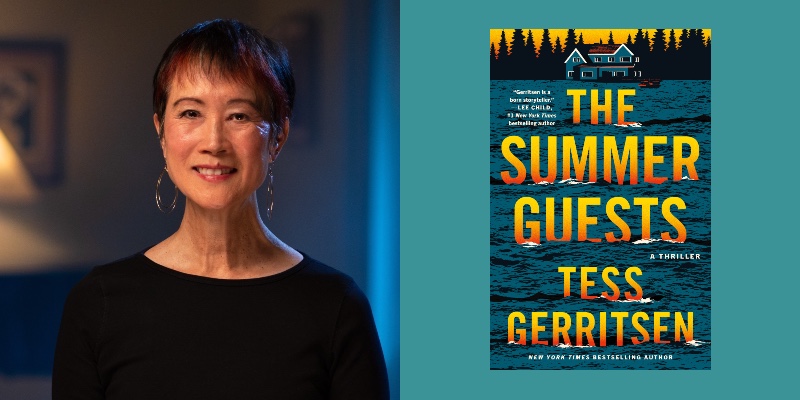Tess Gerritsen may not have been trained in the art of spy craft, but she knows a thing or two about flying under the radar.
As a woman of a certain age, no matter how accomplished (30+ books published in forty countries with sales in excess of forty million copies), Gerritsen has felt firsthand how the “the arrogance of youth” overshadows “the wisdom of experience,” often rendering elders unseen, as if shrouded by an invisibility cloak. This phenomenon, coupled with the discovery that her longtime hometown of Camden, Maine, is a haven for real-life retired spies, served as the inspiration for her unintended, and bestselling, new series: The Martini Club.
The saga launched with 2023’s The Spy Coast, which introduced Maggie Bird and friends—five retirees of the CIA who have all come to make their home in the fictional town of Purity. And while their frequent get togethers are ostensibly for purposes of talking books and sipping cocktails, their individual and collective histories ensure that a bit of intrigue is all but inevitable. Indeed, a body was literally delivered to Maggie’s door, instigating an international adventure that revisited the past upon the present—and drew the attention of acting police chief Jo Thibodeau.
In The Summer Guests, the action is confined to Purity, where the solitude of the long winter months has been disrupted by the arrival of seasonal residents and tourists, which always leads to a spike in crime and conflict. When a teenager goes missing and Maggie’s neighbor falls under suspicion, the Martini Club must once again call on their training to stop a rush to judgment (and potentially save a life). But this time, they’ll have to confront the power and prestige of the wealthy Conover family—not to mention the secret, sordid history of Purity itself.
Now, Tess Gerritsen discusses how making new (fictional) friends led her to spin a would-be standalone novel into an ongoing series …
John B. Valeri: The Summer Guests is the second book in the Martini Club series. What are the joys of expanding on the characters and circumstances you introduced in The Spy Coast? Also, tell us about your approach to melding backstory with narrative momentum so that readers are in the know without being bogged down in unnecessary exposition.
Tess Gerritsen: I didn’t know this would be a series until I finished writing The Spy Coast and realized I’d fallen in love with these characters. That’s what inspired me to make this a series—the characters become my friends, and I wanted to know more about them. Because the first book focused completely on Maggie, the second book was my chance to expand their universe and find out more about them and the community they live in. In particular, I wanted to look more at Jo Thibodeau, the local chief of police, and how her ties to the community make her its fiercest defender. The melding of backstory with narrative momentum is always a challenge. Rather than spoon-feed the backstory of the Martini club to the reader, I chose to include just snippets of information from their past. By watching how these five old spies interact, and their clear affection with each other, you should know enough to simply focus on the new adventure in this book.
JBV: While Thy Spy Coast had an element of globetrotting, The Summer Guests is set exclusively in and around the fictional town Purity, Maine. What was the appeal of limiting your setting? Also, tell us about the line between fact and fiction in using your hometown of Camden, Maine (and its population of retired spies) as an inspiration for Purity.
TG: This story was inspired by something I’d heard during a casual conversation with a woman whose father (a CIA retiree) had worked here in Maine on the CIA’s MKULTRA project. That was the first time I’d heard that Maine was one of the locations for that project. I already knew that we had quite a few CIA retirees here in the mid-coast, and with that fascinating history about MKULTRA, the story became very Maine-centric. It also gave me a chance to explore the tensions between local Mainers and those who come “from away.” Fact and fiction began to blend together as I wrote The Summer Guests, incorporating not just the CIA aspect, but also the conflicts that always arise between haves and have-nots.
JBV: Former spy Maggie Bird, much like Angela Rizzoli and Det. Frankie Loomis before her, is a woman of a certain age who feels largely invisible to the world around her. How is she able to use others’ dismissal and/or underestimation to her advantage in sleuthing/subverting expectations? In what ways have your own experiences as a woman of a similar age informed these characters’ feelings and actions?
TG: I couldn’t have written this series as a younger woman. Age has given me a personal glimpse into how older people—especially women—are easily ignored or discounted. We often see it in the workplace, where young people with dazzling technical skills don’t always see the value of older people, who know all the institutional history. Not to bring too much politics into this, but I certainly see it in the way some of our country’s most treasured institutions, developed over decades of hard work, can be so easily dismantled by a few young people who have no knowledge of how those institutions were built. The arrogance of youth, vs. the wisdom of experience, is one of the central conflicts in this story. It’s also a large part of the fun in writing the books—watching Jo Thibodeau come to terms with the fact that these old people can investigate rings around her.
JBV: Susan has just married into the prosperous and privileged Conover family, which has a history that long supersedes her. In what ways does this chasm color the response to her daughter Zoe’s disappearance, both on personal and professional levels? How does this play off of the larger issue of friction between Purity’s full-time and seasonal residents, which is a recurring theme throughout the book?
TG: There are a lot of conflicts going on in this story. Rich vs. poor, local vs. outsiders, youth vs. older people, spies vs. civilians. Susan, who comes from modest circumstances, has married into the wealthy Conover family, and she finds herself at the center of multiple conflicts. When her daughter Zoe goes missing, there’s another, even more painful conflict: family vs. outsider. Zoe is her child from an earlier marriage, so she’s not really a Conover, and the family seems almost indifferent to the girl’s disappearance. I could feel Susan’s pain, her fear, and her sense of isolation within this family as she frantically looks for her daughter while no one else seems to care.
JBV: Maggie and her fellow members of the Martini Club are uniquely qualified to investigate Zoe’s disappearance (among other mysteries) despite their current status as civilians. Tell us about the dynamic between them and acting police chief Jo Thibodeau. In what ways has the relationship improved despite ongoing tensions and turn wars? Why is this continuing friction important for a continuing saga?
TG: Oh, this is the fun part of writing the series: Watching Jo Thibodeau learn to respect these old folks and even come to value their contribution. In The Spy Coast, Jo didn’t know who she was dealing with. She thought they were just a group of retirees who liked to drink martinis and talk about books. Little by little, as they’re repeatedly a step ahead of her during that first investigation, she realizes these people have, shall we say, a “particular set of skills.” In The Summer Guests, she’s more tolerant of their meddling, but she still resists it because the rich Conover family is looking over her shoulder. This push and pull of Jo’s relationship with the retirees is part of what drives the series forward.
JBV: Speaking of the Martini Club: While Maggie is the focal point, her fellow members each have unique personality traits and talents. What are the keys to developing secondary characters that are multi-dimensional and amplify the principal character(s) and plot?
TG: I don’t really know how characters take shape! It seems to happen magically by itself, so I can’t tell you the moment when I thought, “Lloyd the former analyst feels perpetually insecure and inadequate because he never worked undercover like his wife,” or “Declan the diplomat’s son can charm any secret out of the local realtor.” These details just seem to appear while I’m writing them, and I can’t explain where they come from. It certainly doesn’t come from doing biographical sketches ahead of time. I prefer to let people show themselves organically, and I’m often surprised. In The Summer Guests, one of my characters Ben Diamond, who’s a scary and thuggish man, suddenly goes gaga over a dog that’s attached itself to him. Ben’s never had a dog, and now you see how this dog has brought out a hilariously tender side we never knew he had.
JBV: There are some fun meta elements in this story, including the Martini Club discussing the pitfalls of the spy novel and an author struggling to complete his next novel. Please discuss how you were able to draw on your own life in writing (and being read/reviewed) to inform such self-referential moments. Is there a conscious element of keeping these “winks” subtle so they don’t take the reader out of the story?
TG: Yeah, those “winks” are fun to introduce. One of my characters in The Summer Guests is a novelist struggling with second-book-syndrome, and that struggle (which I remember well) seemed like an utterly believable reason why he wasn’t paying as much attention as he should have to his daughter’s whereabouts. So when she goes missing, he’s tormented by guilt. He realizes how little his writing matters when his family is threatened. I’m sure all writers similarly use their own lives as inspiration for character elements.
JBV: For those who are unaware: You recently had your Facebook page hijacked by scammers posing as seemingly reputable media outlets. What words of caution would you offer to others who may be vulnerable to similar schemes (and the resultant efforts to regain control)?
TG: Yes, that was a painful lesson! I’ve been a guest on many podcasts over the years, and when I got a seemingly legit invitation to be a guest on another one, it seemed like just another interview. Really, why would anyone want to hijack a Facebook page? It had no links to my finances or to other social media accounts. I agreed to the interview, and over a Zoom prep for what would be a Facebook live event, I allowed them to burrow into my Facebook admin page. Within a day or two, the hijackers were posting stupid videos on my page. It took several weeks, and a lot of help, before I regained control. The lesson? Be far more suspicious. Don’t accept any invitations unless they’re referred by trusted sources.
JBV: Leave us with a teaser: What comes next?
TG: I’m working on The Shadow Friends, the third book in the Martini Club series. This story focuses on Ingrid Slocum and her past. When an ex-lover—and charming fellow spy—walks back into her life, she joins him in battling an old adversary. With her marriage and her peaceful life in Purity under threat, Ingrid must re-enter the world she thought she’d left behind.

















